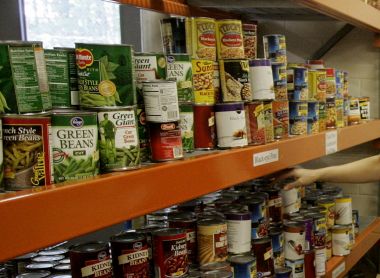100,000 children affected by benefit sanctions - how Britain is still going hungry

About 100,000 children were affected by benefit sanctions last year, according to a new report which says people are still going hungry in modern Britain.
The research shows that nearly seven million weeks of sanctions were handed out to benefit claimants.
The data, obtained under the Freedom of Information Act and to be broadcast this evening in Channel 4's Dispatches, is published today by a coalition of churches including the Baptist Union of Great Britain, Church Action on Poverty, the Church in Wales, the Church of Scotland, the Methodist Church and the United Reformed Church.
One victim, James, told the programme: "During the first three weeks of my sanction I continued to look for work as I was required to. By the fourth week however I was exhausted, unwell and no longer had it in me. I was not eating as I had no food and was losing a lot of weight. I told the job centre I was unwell through not eating but was sanctioned for another three months for not looking for work properly."
Paul Morrison, an adviser to the Methodist Church and one of the authors of the report, said: "Those who already have the most difficult lives are those most likely to be sanctioned. Sanctions impact disproportionately on young people, care leavers, homeless people, single parents, the mentally ill and those with long term illness. This system causes problems for the very people that most need help.
"But sanctions don't just have a financial impact. The people we've spoken to have told us of the shame, demoralisation and loss of self-worth caused by this system. As Christians we believe that everyone is loved, valued and made in the image of God, and we have a responsibility to challenge any structure or system that undermines that dignity."
The churches have called for a full and independent review of the regime and for urgent reform of the hardship payments system. They are also calling on the Government to suspend all sanctions against families with children and those suffering from mental health problems.
Niall Cooper, director of Church Action on Poverty, said: "If you commit a crime, no criminal court in the UK is allowed to make you go hungry as a punishment. But if you're late for an appointment at the Jobcentre, they can remove all your income and leave you unable to feed you or your family for weeks at a time. Most people in this country would be shocked if they knew that far from providing a safety net, the benefit sanctions policy is currently making thousands of people destitute. This policy must be reviewed urgently."
The Archbishop of Wales, Dr Barry Morgan, said: "The findings of this report are disturbing. It exposes a system that is harsh in the extreme, penalising the most vulnerable of claimants by the withdrawal of benefits for weeks at a time. Most worryingly, it appears from DWP guidance, quoted in the report, that deprivation and hunger are knowingly being used as a punishment for quite trivial breaches of benefit conditions. Employers would not be allowed to stop someone's wages for a month the first time they were 10 minutes late for an appointment, but this is the kind of sanction that is being imposed on some of the most vulnerable people in our society, including those with mental and physical health problems.
"We are concerned that the problem may be even worse in Wales, recognising the higher levels of poverty in this country."











